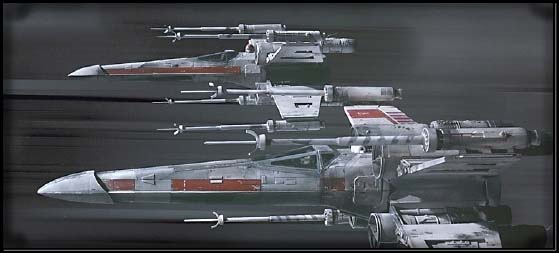
Step 3- Playing in
the Tournament.
When you go to a tournament, lots
of things happen. Many of these things aren't actually involved with
playing cards, but, much of it supports those players who do play.
In fact, a lot of these things happen without you even knowing about it.
For instance, when you arrive at a tournament,
you'll notice that the tournament director is already there. This
is normal. One of his jobs, as the tournament organizer, is to greet
all of the players when they arrive. What you might not know is,
that this tournament director, in setting up the tournament for you, already
coordinated with the local retail as to prizes and gaming space.
You'll be asked to fill out a command card.
When you get this command card, fill it out as completely and as legibly as possible. This is because that sometimes, the tournament director must send these cards in to Decipher so that they may post the tournament rankings. Additionally, if you are new to the area, the tournament director might use your address and email to send you information about upcoming tournaments and events. This, obviously, is beneficial to you. Being proactive, you can fill out one for yourself earlier and run copies… That way, all you have to do is walk into the tournament with one in hand. That'll save on writing everything out by hand over and over again.
Often times there'll be an entrance fee. This is also normal and would range from five dollars on up. This fee is to cover any table fees, prize purchases and other tournament administrative costs. For instance, in many of my tournaments, I'll charge ten dollars. This money will go into the purchase of prizes and food for the tournament patrons.
Well, that's all fine and dandy, Mike, but how do I play in one of these tournaments? Here are a few rules of thumb that I've come to learn in the many tournaments that I've played in and ran:
Tournament Rule #1: Never let them see you sweat!
This first rule in tournament play is often the hardest to follow. There are a lot of really great players out there and it's hard to keep your composure when you're paired up against one of them.
However, you've got to remember not to let them intimidate you. It's easy to feel like you're already beaten once you've heard you name matched with his. This feeling will horribly effect you're game. Experience has taught me, "Once you believe you're beaten, you'll find a way to actually make it happen." You'll toss cards that you would normally need. You'll get flustered and make foolish mistakes.
In fact, there are some players out there that will key on this. These players are the ultra-competitors. They want to win no matter who they play, or how they play. By and large, most players aren't like this, however, in every game, you'll always have them. These type of players will play little tricks with your psyche, they'll try the mind game with you. Against players like this, the best thing you can do, is stay calm and play you best.
Tournament Rule #2: Go Slow!!!
I see this rule broken so many times.
What I mean by going slow is to take your time when you play your games.
Now there's a difference between taking your time and being patient  and
actual stalling.
and
actual stalling.
For instance, it's very common for a player to totally skip the Control Phase. One of the most common mistakes made by players is to forget to Force drain. Force draining is a critical aspect of the game. It, by itself is the single most effective way of causing your opponent to lose Force, and thus, win you the game. However, it's often neglected in favor of a swift deploy in preparation for an upcoming battle, or movement away from an impending beatdown.
By taking your time during the game, you being patient, it'll be easier to remember important game functions such as Force draining (or other cards like Search and Destroy).
Tournament Rule #3: Watch your opponent:
Another oft-committed error. Many players, so taken up by their own game, often forget to watch what their opponent is doing.
Do you know how easy it is to over activate? Or pay less when deploying a card? Or shifting cards from one pile to another? Some times cards in protective sleeves casn stick together, particularly when they sleeve gets damp from the persperation from your hand. This can lead to cards being moved around from one pile to another together without the owner knowing about it.
It really easy to get all caught up in your own game… What with trying to meet an objective requirements to flip, trying to avoid getting dueled, making sure you got all of your locations covered, planning ahead for your next turn, checking what cards you have in your hand, tracking the destiny 7 that cycling through your reserve… Lots of things. But, it's also easy for your opponent to perform mistakes on his turn that can cost you!
Keep an eye on what he's doing. Make sure he's activating what he'supposed to. Make sure he deploys the way he's supposed to.
Also, if you feel that he's playing too fast for you. If you're having a problem keeping up with him. Ask him to slow down for you. You have the right to react to each and every action performed by your opponent. He has to give you time to announce these reactions, if any. He simply can't rip through his turn in hopes that you'd forget to play during his turn.
Tournament Rule #4: Make sure you pick up after yourself:
With all of the Undercover Spies, inserts, "deploy on opponent's side of table" effect, it's easy to let one of your cards get picked up by your opponent.
This can potentially hurt you in a later game if that card(s) isn't returned.
At the end of the game count your deck real quick to make sure all of your cards are present and accounted for. You'll be glad you did.
Tournament Rule #5: Start slow, Finish strong:
I've learned early in my tournament playing career that if you finish you early games with a high differential, you'll get stuck with the other great players that also won with high differentials.
Often times, it takes a couple of games to get your feel of a tournament and how your decks are competing with the other decks there. This is especially true with new decks that you've had limited tournament time with.
You don't want to get off to a fast start and get your clock cleaned by the other top guns there because you haven't gotten acclimated to the tournament yet.
A modest start with put you around the middle of the playing field. This way, the power curve is in your favor. Plus, by playing the middle of the road, you won't have to deal with the hot shots just yet (and thus, avoid Rule #1).
Tournament Rule #6: Just Win Baby!
This common phase from Oakland Raider football couldn't be closer to the truth with Star Wars CCG.
I can tell you that around 85-90% of all of my tournaments are won by only one player that goes undefeated. In fact, this is the only player that wins all of his games. I rarely see more that one undefeated player.
Yet, despite all of this, I keep having players ask me what differential they have. To coin a phase… "It doesn't matter what your differential is!"
Let me tell you a story about one tournament that I played in. My differential in each of my games never got above 13 cards. In fact, most of my games I won by 7 cards or less. However, I won all my games, and I ended up taking the tournament even though there were other players there with much higher differentials than me. Why? Because, I won all of my games and they didn't.
While you're playing, don't worry too much about trying to win by a lot of cards. It's hard enough worrying about just trying to win.
Tournament Rule #7: Watch The Signs:
In experienced players often get caught by surprise because they aren't trained to know what to look for while playing. Here are some of the signs that you should watch for while you're playing:

Easier said than done, you jest. I'm not kidding! I swear I see some of the dumbest, most insane game play. Players be deploying lone x-wing to get killed, starting with the Death Star: Trash Compactor, deploying Vader to the Holotheater where the only good he does is keep spies from canceling Visage Of The Emperor.
Being a good player and winning tournaments takes more than just remember to Force drain from time to time. It takes thought, planning and avoiding dumb mistakes. Here are some tips that I often see in a tournament:
Soon, you too will be among the elite tournament players in Star Wars CCG!
Excelsior!
